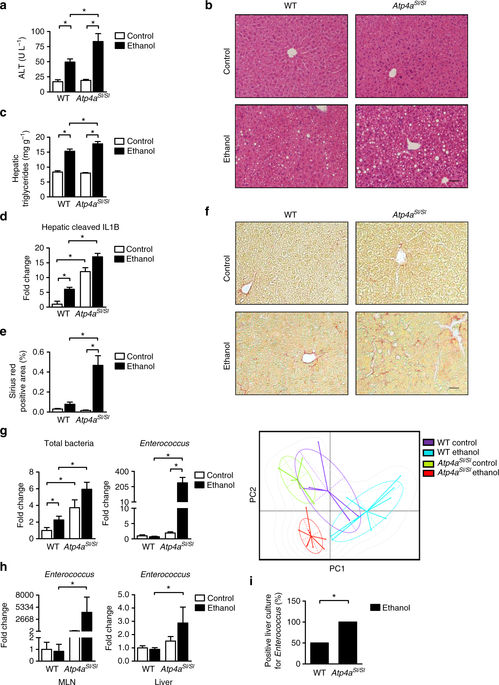当前位置:
X-MOL 学术
›
Nat. Commun.
›
论文详情
Our official English website, www.x-mol.net, welcomes your feedback! (Note: you will need to create a separate account there.)
Gastric acid suppression promotes alcoholic liver disease by inducing overgrowth of intestinal Enterococcus.
Nature Communications ( IF 14.7 ) Pub Date : 2017-10-16 , DOI: 10.1038/s41467-017-00796-x Cristina Llorente , Peter Jepsen , Tatsuo Inamine , Lirui Wang , Sena Bluemel , Hui J. Wang , Rohit Loomba , Jasmohan S. Bajaj , Mitchell L. Schubert , Masoumeh Sikaroodi , Patrick M. Gillevet , Jun Xu , Tatiana Kisseleva , Samuel B. Ho , Jessica DePew , Xin Du , Henrik T. Sørensen , Hendrik Vilstrup , Karen E. Nelson , David A. Brenner , Derrick E. Fouts , Bernd Schnabl
Nature Communications ( IF 14.7 ) Pub Date : 2017-10-16 , DOI: 10.1038/s41467-017-00796-x Cristina Llorente , Peter Jepsen , Tatsuo Inamine , Lirui Wang , Sena Bluemel , Hui J. Wang , Rohit Loomba , Jasmohan S. Bajaj , Mitchell L. Schubert , Masoumeh Sikaroodi , Patrick M. Gillevet , Jun Xu , Tatiana Kisseleva , Samuel B. Ho , Jessica DePew , Xin Du , Henrik T. Sørensen , Hendrik Vilstrup , Karen E. Nelson , David A. Brenner , Derrick E. Fouts , Bernd Schnabl

|
Chronic liver disease is rising in western countries and liver cirrhosis is the 12th leading cause of death worldwide. Simultaneously, use of gastric acid suppressive medications is increasing. Here, we show that proton pump inhibitors promote progression of alcoholic liver disease, non-alcoholic fatty liver disease, and non-alcoholic steatohepatitis in mice by increasing numbers of intestinal Enterococcus spp. Translocating enterococci lead to hepatic inflammation and hepatocyte death. Expansion of intestinal Enterococcus faecalis is sufficient to exacerbate ethanol-induced liver disease in mice. Proton pump inhibitor use increases the risk of developing alcoholic liver disease among alcohol-dependent patients. Reduction of gastric acid secretion therefore appears to promote overgrowth of intestinal Enterococcus, which promotes liver disease, based on data from mouse models and humans. Recent increases in the use of gastric acid-suppressive medications might contribute to the increasing incidence of chronic liver disease.Proton pump inhibitors (PPIs) reduce gastric acid secretion and modulate gut microbiota composition. Here Llorente et al. show that PPIs induce bacterial overgrowth of enterococci, which, in turn, exacerbate ethanol-induced liver disease both in mice and humans.
中文翻译:

抑制胃酸会引起肠道肠球菌的过度生长,从而促进酒精性肝病。
西方国家的慢性肝病正在上升,肝硬化是全球第十二大死亡原因。同时,胃酸抑制药物的使用正在增加。在这里,我们表明质子泵抑制剂通过增加肠道肠球菌的数量来促进小鼠酒精性肝病,非酒精性脂肪性肝病和非酒精性脂肪性肝炎的进展。易位性肠球菌引起肝炎和肝细胞死亡。肠屎肠球菌的扩增足以加剧乙醇诱发的小鼠肝病。在酒精依赖患者中使用质子泵抑制剂会增加患酒精性肝病的风险。因此,减少胃酸分泌似乎会促进肠道肠球菌的过度生长,从而加剧肝脏疾病,基于鼠标模型和人类的数据。最近使用胃酸抑制药物的增加可能会导致慢性肝病的发生率增加。质子泵抑制剂(PPI)会减少胃酸分泌并调节肠道菌群的组成。在这里Llorente等。研究表明,PPI会引起肠球菌细菌过度生长,进而加剧小鼠和人类的乙醇诱发的肝病。
更新日期:2017-10-16
中文翻译:

抑制胃酸会引起肠道肠球菌的过度生长,从而促进酒精性肝病。
西方国家的慢性肝病正在上升,肝硬化是全球第十二大死亡原因。同时,胃酸抑制药物的使用正在增加。在这里,我们表明质子泵抑制剂通过增加肠道肠球菌的数量来促进小鼠酒精性肝病,非酒精性脂肪性肝病和非酒精性脂肪性肝炎的进展。易位性肠球菌引起肝炎和肝细胞死亡。肠屎肠球菌的扩增足以加剧乙醇诱发的小鼠肝病。在酒精依赖患者中使用质子泵抑制剂会增加患酒精性肝病的风险。因此,减少胃酸分泌似乎会促进肠道肠球菌的过度生长,从而加剧肝脏疾病,基于鼠标模型和人类的数据。最近使用胃酸抑制药物的增加可能会导致慢性肝病的发生率增加。质子泵抑制剂(PPI)会减少胃酸分泌并调节肠道菌群的组成。在这里Llorente等。研究表明,PPI会引起肠球菌细菌过度生长,进而加剧小鼠和人类的乙醇诱发的肝病。















































 京公网安备 11010802027423号
京公网安备 11010802027423号